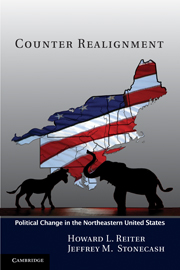Book contents
- Frontmatter
- Contents
- List of Figures
- List of Tables
- Preface
- Acknowledgments
- Postscript: Democratic Fortunes in the Northeast in 2010
- 1 Party Strategies and Transition in the Northeast
- 2 Party Pursuits and the Sources of Change
- 3 The First Republican Losses
- 4 Searching for a Majority, the Rise of Conservatives, and Second Losses
- 5 Interpreting the Goldwater Election and Pursuing the South
- 6 Social Change, Party Response, and Further Republican Losses
- 7 National Parties and the Position of the Northeast
- 8 The Process of Change and the Future
- Index
Preface
Published online by Cambridge University Press: 05 June 2012
- Frontmatter
- Contents
- List of Figures
- List of Tables
- Preface
- Acknowledgments
- Postscript: Democratic Fortunes in the Northeast in 2010
- 1 Party Strategies and Transition in the Northeast
- 2 Party Pursuits and the Sources of Change
- 3 The First Republican Losses
- 4 Searching for a Majority, the Rise of Conservatives, and Second Losses
- 5 Interpreting the Goldwater Election and Pursuing the South
- 6 Social Change, Party Response, and Further Republican Losses
- 7 National Parties and the Position of the Northeast
- 8 The Process of Change and the Future
- Index
Summary
In recent decades, political science has made great strides in understanding the process by which parties and their leaders strategize to build new majority coalitions. Alongside traditional emphases on social and demographic changes and their partisan consequences – what we might call structural causes of political change – there is a new focus on deliberate strategies by party elites, an emphasis on agency. This academic trend was inspired in part by the remarkable renewal of the Republican Party in the past half-century, and especially its extreme growth in the South.
Whereas much has been learned about such strategies, some aspects of these developments have not received adequate attention. Just as the perspective of the victors of wars tends to dominate the history books, ascendant parties enjoy special attention from parties' scholars. We have many books about the Republican surge in the South, but less research on where the party lost strength. This distortion has entailed underemphasis on certain parts of the country.
Our analysis is an attempt to correct these imbalances by examining the very important changes in the Northeast, the region where the Republicans have suffered the most over that same half-century. Almost in reverse correlation with Republican advances in the South have come Republican losses in the Northeast, which for much of the party's history was its strongest base.
Information
- Type
- Chapter
- Information
- Counter RealignmentPolitical Change in the Northeastern United States, pp. xiii - xivPublisher: Cambridge University PressPrint publication year: 2011
